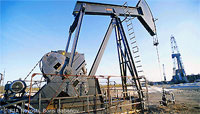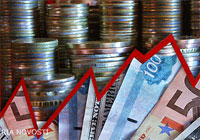Oil price decline a burst of the bubble, or just a blip?
Industry experts differ sharply over prognoses for a fall in commodity values
Olga Khrustaleva - Moscow News - themoscownews.com - 7.6.12 - JRL 2012-122
As oil prices dropped to $88 per barrel at the end of June, nearing a yearly nadir, analysts began to talk about a burst in a commodities bubble.

file photo
Ruchir Sharma, head of emerging markets at Morgan Stanley Investment Management, said in an article for The Financial Times that the falling price was a sign of a "major shift in the global economy" and the end of the socalled "commodity supercycle." He drew parallels between the current situation and the dotcom bubble of the 1990s, outlining the negative effects a burst would have on Russia.
Many analysts disagree with Sharma, but it is clear that the unstable price presents a serious concern for Russia.

file photo
Overheated
According to Andrei Bely, of the Higher School of Economics, an oil price higher than $100 per barrel is overheated, because "in reality the players are willing to buy it at a lower price, and the demand is not reflected in the price."
Many experts have predicted a falling price because of the overheating, but the Russian government nevertheless included the $100 price in its 2012 budget, confounding expectations of backwardation, when all indicators in the market show that the price is set to decline.
"In the context of backwardation, when the players are expecting a lower price, including a higher price [in the budget] certainly carries a risk," Bely told The Moscow News. It also contradicts the previous and more realistic policy where the oil price included in the budget was about $80.
More ways to go than down
However, along with factors that drag the price down, such as the European Union financial crisis, or falling or stagnating demand, there are also factors that make it go up again. Instability in the Middle East sanctions and concerns about possible military operations in Iran, hostilities in Syria, and an uncertain political situation in Egypt, where the newly elected president and former member of the Muslim Brotherhood, Mohammed Morsi, may review some long-accepted aspects of foreign policy is one of the biggest that prompts a growth in price.
"If the new [Egyptian] president reviews the peace treaty with Israel, the price will certainly go up," Bely said. "There is little economic connection between the two, but market players will make use of the information about possible revision of the treaty."
"It is difficult to predict, but taking into account the situation in the Middle East, which is not going to improve, the price will rise again," he concluded.
Equities not a safe haven
Sharma attracted criticism within the pages of The Financial Times, in a letter from Christopher Cruden, chief executive of Swissbased Insch Capital Management.
In his response to Sharma's comment, Cruden argued that equity markets themselves are not experiencing a good period.
"It is sad to see what seems to be an attempt to 'talk up' equity investment by talking down commodity investment," he wrote.
The concern over oil prices was strong enough, however, that Russian Finance Minister Anton Siluanov was forced to address them at last month's St. Petersburg International Economic Forum.
"If the oil price falls and goes lower than $80 a barrel, if the growth in the economy falls to around 0 to 1 percent, and if we see that incomes fall sharply below what we forecast in the budget, that will be grounds for introducing anti-crisis measures," Siluanov said on Russia 24 TV, RIA Novosti reported.
Previously, he said 500 billion rubles ($15.5 billion) could be allocated to the federal budget for 2013 for anti-crisis measures.
Keywords: Russia, Oil, Gas, Energy - Russian News - Russia
As oil prices dropped to $88 per barrel at the end of June, nearing a yearly nadir, analysts began to talk about a burst in a commodities bubble.

file photo
Ruchir Sharma, head of emerging markets at Morgan Stanley Investment Management, said in an article for The Financial Times that the falling price was a sign of a "major shift in the global economy" and the end of the socalled "commodity supercycle." He drew parallels between the current situation and the dotcom bubble of the 1990s, outlining the negative effects a burst would have on Russia.
Many analysts disagree with Sharma, but it is clear that the unstable price presents a serious concern for Russia.

file photo
Overheated
According to Andrei Bely, of the Higher School of Economics, an oil price higher than $100 per barrel is overheated, because "in reality the players are willing to buy it at a lower price, and the demand is not reflected in the price."
Many experts have predicted a falling price because of the overheating, but the Russian government nevertheless included the $100 price in its 2012 budget, confounding expectations of backwardation, when all indicators in the market show that the price is set to decline.
"In the context of backwardation, when the players are expecting a lower price, including a higher price [in the budget] certainly carries a risk," Bely told The Moscow News. It also contradicts the previous and more realistic policy where the oil price included in the budget was about $80.
More ways to go than down
However, along with factors that drag the price down, such as the European Union financial crisis, or falling or stagnating demand, there are also factors that make it go up again. Instability in the Middle East sanctions and concerns about possible military operations in Iran, hostilities in Syria, and an uncertain political situation in Egypt, where the newly elected president and former member of the Muslim Brotherhood, Mohammed Morsi, may review some long-accepted aspects of foreign policy is one of the biggest that prompts a growth in price.
"If the new [Egyptian] president reviews the peace treaty with Israel, the price will certainly go up," Bely said. "There is little economic connection between the two, but market players will make use of the information about possible revision of the treaty."
"It is difficult to predict, but taking into account the situation in the Middle East, which is not going to improve, the price will rise again," he concluded.
Equities not a safe haven
Sharma attracted criticism within the pages of The Financial Times, in a letter from Christopher Cruden, chief executive of Swissbased Insch Capital Management.
In his response to Sharma's comment, Cruden argued that equity markets themselves are not experiencing a good period.
"It is sad to see what seems to be an attempt to 'talk up' equity investment by talking down commodity investment," he wrote.
The concern over oil prices was strong enough, however, that Russian Finance Minister Anton Siluanov was forced to address them at last month's St. Petersburg International Economic Forum.
"If the oil price falls and goes lower than $80 a barrel, if the growth in the economy falls to around 0 to 1 percent, and if we see that incomes fall sharply below what we forecast in the budget, that will be grounds for introducing anti-crisis measures," Siluanov said on Russia 24 TV, RIA Novosti reported.
Previously, he said 500 billion rubles ($15.5 billion) could be allocated to the federal budget for 2013 for anti-crisis measures.